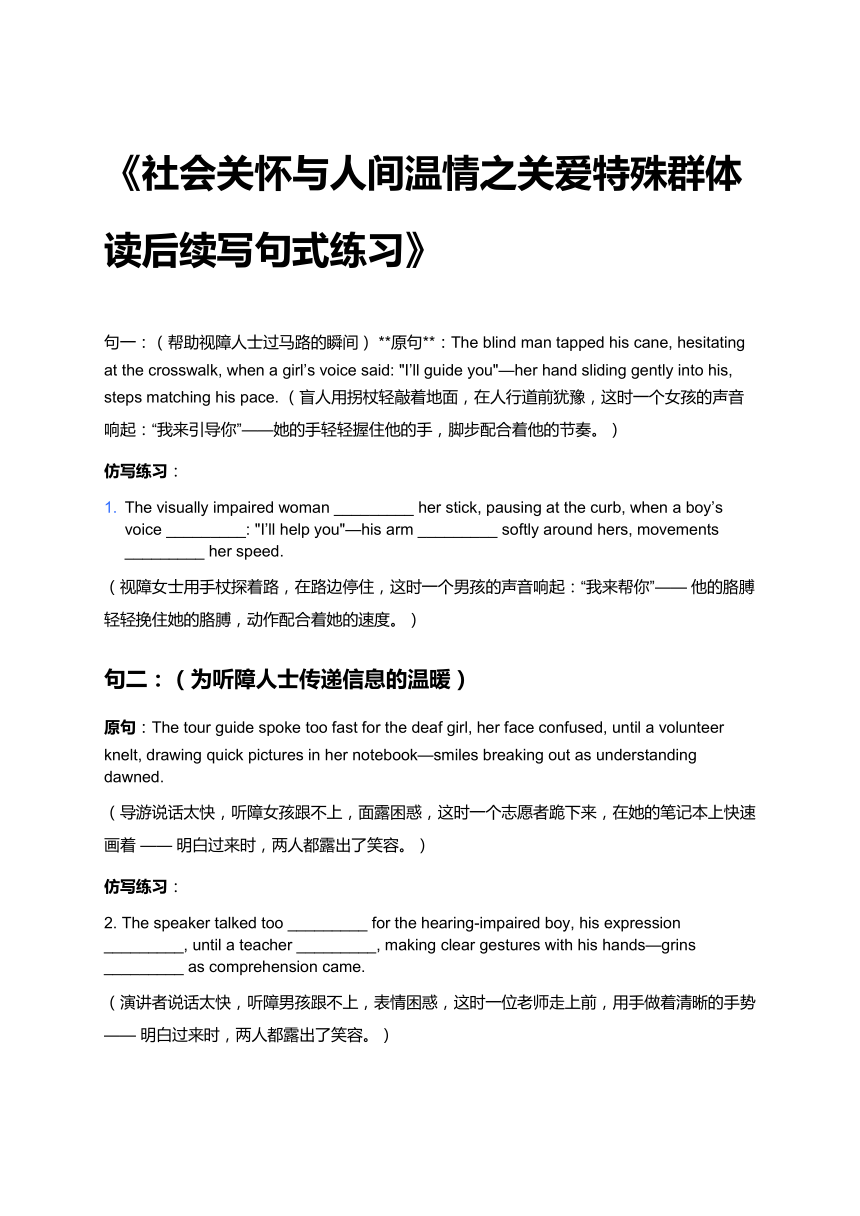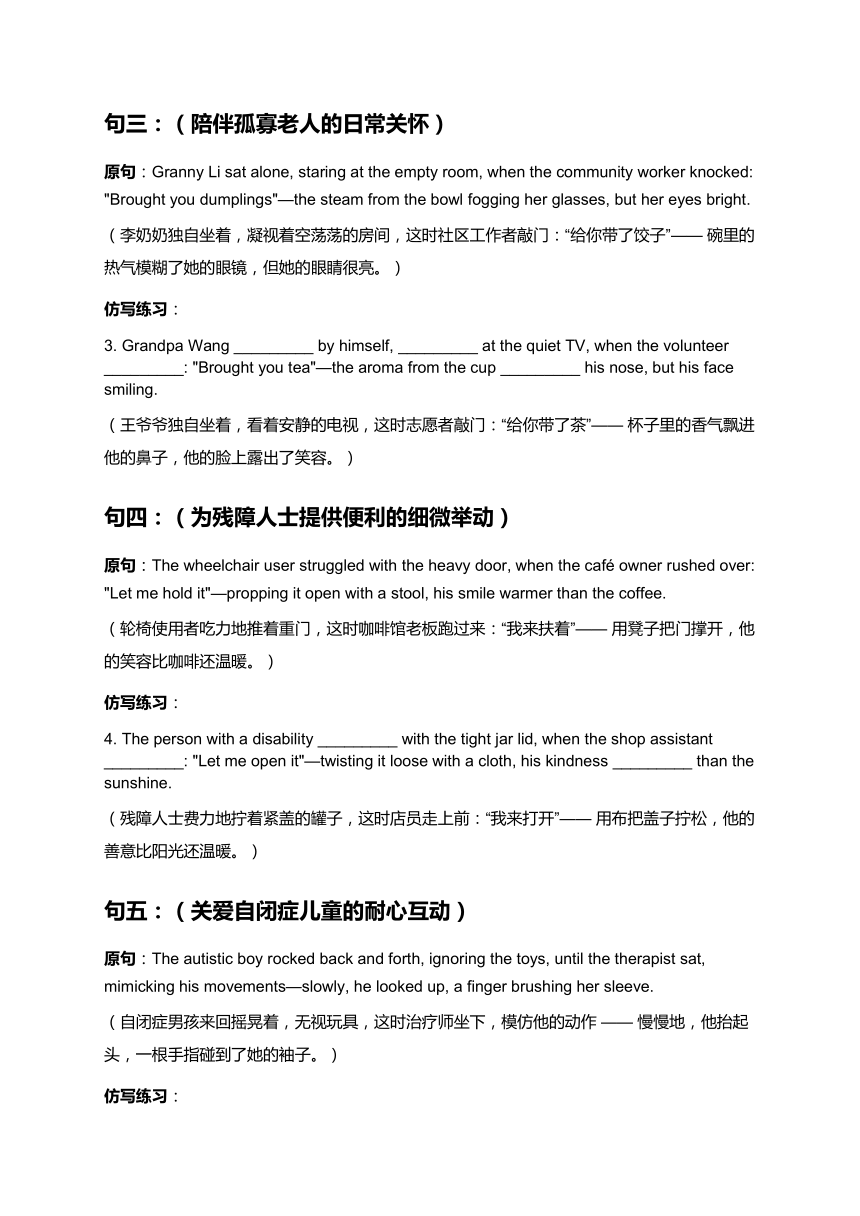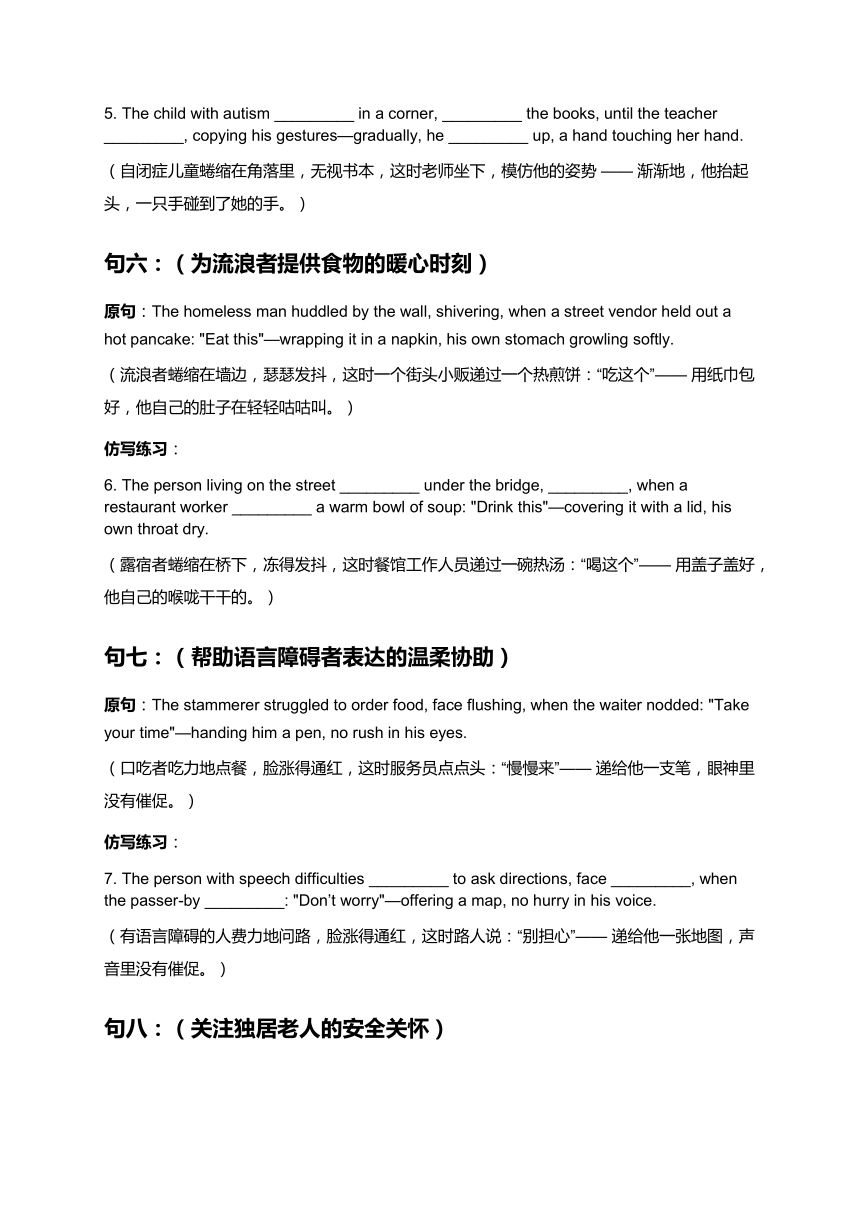社会关怀与人间温情之关爱特殊群体读后续写句式练习(含答案)-2026届高三英语上学期一轮复习专项
文档属性
| 名称 | 社会关怀与人间温情之关爱特殊群体读后续写句式练习(含答案)-2026届高三英语上学期一轮复习专项 |  | |
| 格式 | docx | ||
| 文件大小 | 19.2KB | ||
| 资源类型 | 教案 | ||
| 版本资源 | 人教版(2019) | ||
| 科目 | 英语 | ||
| 更新时间 | 2025-07-24 12:04:41 | ||
图片预览



文档简介
《社会关怀与人间温情之关爱特殊群体读后续写句式练习》
句一:(帮助视障人士过马路的瞬间) **原句**:The blind man tapped his cane, hesitating at the crosswalk, when a girl’s voice said: "I’ll guide you"—her hand sliding gently into his, steps matching his pace. (盲人用拐杖轻敲着地面,在人行道前犹豫,这时一个女孩的声音响起:“我来引导你”——她的手轻轻握住他的手,脚步配合着他的节奏。)
仿写练习:
The visually impaired woman _________ her stick, pausing at the curb, when a boy’s voice _________: "I’ll help you"—his arm _________ softly around hers, movements _________ her speed.
(视障女士用手杖探着路,在路边停住,这时一个男孩的声音响起:“我来帮你”—— 他的胳膊轻轻挽住她的胳膊,动作配合着她的速度。)
句二:(为听障人士传递信息的温暖)
原句:The tour guide spoke too fast for the deaf girl, her face confused, until a volunteer knelt, drawing quick pictures in her notebook—smiles breaking out as understanding dawned.
(导游说话太快,听障女孩跟不上,面露困惑,这时一个志愿者跪下来,在她的笔记本上快速画着 —— 明白过来时,两人都露出了笑容。)
仿写练习:
2. The speaker talked too _________ for the hearing-impaired boy, his expression _________, until a teacher _________, making clear gestures with his hands—grins _________ as comprehension came.
(演讲者说话太快,听障男孩跟不上,表情困惑,这时一位老师走上前,用手做着清晰的手势 —— 明白过来时,两人都露出了笑容。)
句三:(陪伴孤寡老人的日常关怀)
原句:Granny Li sat alone, staring at the empty room, when the community worker knocked: "Brought you dumplings"—the steam from the bowl fogging her glasses, but her eyes bright.
(李奶奶独自坐着,凝视着空荡荡的房间,这时社区工作者敲门:“给你带了饺子”—— 碗里的热气模糊了她的眼镜,但她的眼睛很亮。)
仿写练习:
3. Grandpa Wang _________ by himself, _________ at the quiet TV, when the volunteer _________: "Brought you tea"—the aroma from the cup _________ his nose, but his face smiling.
(王爷爷独自坐着,看着安静的电视,这时志愿者敲门:“给你带了茶”—— 杯子里的香气飘进他的鼻子,他的脸上露出了笑容。)
句四:(为残障人士提供便利的细微举动)
原句:The wheelchair user struggled with the heavy door, when the café owner rushed over: "Let me hold it"—propping it open with a stool, his smile warmer than the coffee.
(轮椅使用者吃力地推着重门,这时咖啡馆老板跑过来:“我来扶着”—— 用凳子把门撑开,他的笑容比咖啡还温暖。)
仿写练习:
4. The person with a disability _________ with the tight jar lid, when the shop assistant _________: "Let me open it"—twisting it loose with a cloth, his kindness _________ than the sunshine.
(残障人士费力地拧着紧盖的罐子,这时店员走上前:“我来打开”—— 用布把盖子拧松,他的善意比阳光还温暖。)
句五:(关爱自闭症儿童的耐心互动)
原句:The autistic boy rocked back and forth, ignoring the toys, until the therapist sat, mimicking his movements—slowly, he looked up, a finger brushing her sleeve.
(自闭症男孩来回摇晃着,无视玩具,这时治疗师坐下,模仿他的动作 —— 慢慢地,他抬起头,一根手指碰到了她的袖子。)
仿写练习:
5. The child with autism _________ in a corner, _________ the books, until the teacher _________, copying his gestures—gradually, he _________ up, a hand touching her hand.
(自闭症儿童蜷缩在角落里,无视书本,这时老师坐下,模仿他的姿势 —— 渐渐地,他抬起头,一只手碰到了她的手。)
句六:(为流浪者提供食物的暖心时刻)
原句:The homeless man huddled by the wall, shivering, when a street vendor held out a hot pancake: "Eat this"—wrapping it in a napkin, his own stomach growling softly.
(流浪者蜷缩在墙边,瑟瑟发抖,这时一个街头小贩递过一个热煎饼:“吃这个”—— 用纸巾包好,他自己的肚子在轻轻咕咕叫。)
仿写练习:
6. The person living on the street _________ under the bridge, _________, when a restaurant worker _________ a warm bowl of soup: "Drink this"—covering it with a lid, his own throat dry.
(露宿者蜷缩在桥下,冻得发抖,这时餐馆工作人员递过一碗热汤:“喝这个”—— 用盖子盖好,他自己的喉咙干干的。)
句七:(帮助语言障碍者表达的温柔协助)
原句:The stammerer struggled to order food, face flushing, when the waiter nodded: "Take your time"—handing him a pen, no rush in his eyes.
(口吃者吃力地点餐,脸涨得通红,这时服务员点点头:“慢慢来”—— 递给他一支笔,眼神里没有催促。)
仿写练习:
7. The person with speech difficulties _________ to ask directions, face _________, when the passer-by _________: "Don’t worry"—offering a map, no hurry in his voice.
(有语言障碍的人费力地问路,脸涨得通红,这时路人说:“别担心”—— 递给他一张地图,声音里没有催促。)
句八:(关注独居老人的安全关怀)
原句:The elderly woman hadn’t answered her door for days, and the neighbor called: "Just checking in"—relieved when she heard the faint "Come in," rushing to make tea.
( elderly woman 好几天没开门了,邻居打电话:“只是看看你”—— 听到微弱的 “进来吧”,松了口气,赶紧去泡茶。)
仿写练习:
8. The old man hadn’t _________ his window open for weeks, and the community guard _________: "Just seeing how you are"—glad when he heard the weak "I’m fine," hurrying to fetch water.
(老人好几个星期没开窗了,社区保安敲门:“只是看看你怎么样”—— 听到微弱的 “我没事”,很高兴,赶紧去打水。)
句九:(为残障人士创造平等机会的努力)
原句:The school built a ramp, and when the wheelchair-bound girl rolled into class, her classmates cheered—no one staring, just high-fives and "glad you’re here."
(学校建了一个坡道,当轮椅女孩滚进教室时,同学们欢呼起来 —— 没人盯着看,只有击掌和 “很高兴你来了”。)
仿写练习:
9. The library _________ braille books, and when the blind boy _________ into the reading room, the other kids _________—no one pointing, just smiles and "welcome."
(图书馆添置了盲文书籍,当盲童走进阅览室时,其他孩子笑了 —— 没人指指点点,只有微笑和 “欢迎”。)
句十:(长期关爱特殊群体的情感联结)
原句:Years of visiting the orphanage, and when the volunteer walked in, the disabled kids swarmed—no formal greetings, just "you’re here!" and clinging to her hands.
(多年来一直去孤儿院,当志愿者走进来时,残疾孩子们围了过来 —— 没有正式的问候,只有 “你来了!” 和紧紧抓住她的手。)
仿写练习:
10. Months of _________ the special school, and when the social worker _________ in, the autistic children _________—no stiff hellos, just "you came!" and holding onto his legs.
(几个月来一直去特殊学校,当社工走进来时,自闭症孩子们围了过来 —— 没有生硬的问候,只有 “你来了!” 和紧紧抱住他的腿。)
参考答案及翻译:
The visually impaired woman tapped her stick, pausing at the curb, when a boy’s voice said: "I’ll help you"—his arm sliding softly around hers, movements matching her speed.
(视障女士用手杖探着路,在路边停住,这时一个男孩的声音响起:“我来帮你”—— 他的胳膊轻轻挽住她的胳膊,动作配合着她的速度。)
The speaker talked too quickly for the hearing-impaired boy, his expression confused, until a teacher stepped forward, making clear gestures with his hands—grins spreading as comprehension came.
(演讲者说话太快,听障男孩跟不上,表情困惑,这时一位老师走上前,用手做着清晰的手势 —— 明白过来时,两人都露出了笑容。)
Grandpa Wang sat by himself, staring at the quiet TV, when the volunteer knocked: "Brought you tea"—the aroma from the cup reaching his nose, but his face smiling.
(王爷爷独自坐着,看着安静的电视,这时志愿者敲门:“给你带了茶”—— 杯子里的香气飘进他的鼻子,他的脸上露出了笑容。)
The person with a disability struggled with the tight jar lid, when the shop assistant came over: "Let me open it"—twisting it loose with a cloth, his kindness warmer than the sunshine.
(残障人士费力地拧着紧盖的罐子,这时店员走上前:“我来打开”—— 用布把盖子拧松,他的善意比阳光还温暖。)
The child with autism curled in a corner, ignoring the books, until the teacher sat down, copying his gestures—gradually, he looked up, a hand touching her hand.
(自闭症儿童蜷缩在角落里,无视书本,这时老师坐下,模仿他的姿势 —— 渐渐地,他抬起头,一只手碰到了她的手。)
The person living on the street huddled under the bridge, shivering, when a restaurant worker held out a warm bowl of soup: "Drink this"—covering it with a lid, his own throat dry.
(露宿者蜷缩在桥下,冻得发抖,这时餐馆工作人员递过一碗热汤:“喝这个”—— 用盖子盖好,他自己的喉咙干干的。)
The person with speech difficulties tried to ask directions, face flushing, when the passer-by smiled: "Don’t worry"—offering a map, no hurry in his voice.
(有语言障碍的人费力地问路,脸涨得通红,这时路人说:“别担心”—— 递给他一张地图,声音里没有催促。)
The old man hadn’t left his window open for weeks, and the community guard knocked: "Just seeing how you are"—glad when he heard the weak "I’m fine," hurrying to fetch water.
(老人好几个星期没开窗了,社区保安敲门:“只是看看你怎么样”—— 听到微弱的 “我没事”,很高兴,赶紧去打水。)
The library added braille books, and when the blind boy stepped into the reading room, the other kids smiled—no one pointing, just smiles and "welcome."
(图书馆添置了盲文书籍,当盲童走进阅览室时,其他孩子笑了 —— 没人指指点点,只有微笑和 “欢迎”。)
Months of visiting the special school, and when the social worker walked in, the autistic children gathered—no stiff hellos, just "you came!" and holding onto his legs.
(几个月来一直去特殊学校,当社工走进来时,自闭症孩子们围了过来 —— 没有生硬的问候,只有 “你来了!” 和紧紧抱住他的腿。)
句一:(帮助视障人士过马路的瞬间) **原句**:The blind man tapped his cane, hesitating at the crosswalk, when a girl’s voice said: "I’ll guide you"—her hand sliding gently into his, steps matching his pace. (盲人用拐杖轻敲着地面,在人行道前犹豫,这时一个女孩的声音响起:“我来引导你”——她的手轻轻握住他的手,脚步配合着他的节奏。)
仿写练习:
The visually impaired woman _________ her stick, pausing at the curb, when a boy’s voice _________: "I’ll help you"—his arm _________ softly around hers, movements _________ her speed.
(视障女士用手杖探着路,在路边停住,这时一个男孩的声音响起:“我来帮你”—— 他的胳膊轻轻挽住她的胳膊,动作配合着她的速度。)
句二:(为听障人士传递信息的温暖)
原句:The tour guide spoke too fast for the deaf girl, her face confused, until a volunteer knelt, drawing quick pictures in her notebook—smiles breaking out as understanding dawned.
(导游说话太快,听障女孩跟不上,面露困惑,这时一个志愿者跪下来,在她的笔记本上快速画着 —— 明白过来时,两人都露出了笑容。)
仿写练习:
2. The speaker talked too _________ for the hearing-impaired boy, his expression _________, until a teacher _________, making clear gestures with his hands—grins _________ as comprehension came.
(演讲者说话太快,听障男孩跟不上,表情困惑,这时一位老师走上前,用手做着清晰的手势 —— 明白过来时,两人都露出了笑容。)
句三:(陪伴孤寡老人的日常关怀)
原句:Granny Li sat alone, staring at the empty room, when the community worker knocked: "Brought you dumplings"—the steam from the bowl fogging her glasses, but her eyes bright.
(李奶奶独自坐着,凝视着空荡荡的房间,这时社区工作者敲门:“给你带了饺子”—— 碗里的热气模糊了她的眼镜,但她的眼睛很亮。)
仿写练习:
3. Grandpa Wang _________ by himself, _________ at the quiet TV, when the volunteer _________: "Brought you tea"—the aroma from the cup _________ his nose, but his face smiling.
(王爷爷独自坐着,看着安静的电视,这时志愿者敲门:“给你带了茶”—— 杯子里的香气飘进他的鼻子,他的脸上露出了笑容。)
句四:(为残障人士提供便利的细微举动)
原句:The wheelchair user struggled with the heavy door, when the café owner rushed over: "Let me hold it"—propping it open with a stool, his smile warmer than the coffee.
(轮椅使用者吃力地推着重门,这时咖啡馆老板跑过来:“我来扶着”—— 用凳子把门撑开,他的笑容比咖啡还温暖。)
仿写练习:
4. The person with a disability _________ with the tight jar lid, when the shop assistant _________: "Let me open it"—twisting it loose with a cloth, his kindness _________ than the sunshine.
(残障人士费力地拧着紧盖的罐子,这时店员走上前:“我来打开”—— 用布把盖子拧松,他的善意比阳光还温暖。)
句五:(关爱自闭症儿童的耐心互动)
原句:The autistic boy rocked back and forth, ignoring the toys, until the therapist sat, mimicking his movements—slowly, he looked up, a finger brushing her sleeve.
(自闭症男孩来回摇晃着,无视玩具,这时治疗师坐下,模仿他的动作 —— 慢慢地,他抬起头,一根手指碰到了她的袖子。)
仿写练习:
5. The child with autism _________ in a corner, _________ the books, until the teacher _________, copying his gestures—gradually, he _________ up, a hand touching her hand.
(自闭症儿童蜷缩在角落里,无视书本,这时老师坐下,模仿他的姿势 —— 渐渐地,他抬起头,一只手碰到了她的手。)
句六:(为流浪者提供食物的暖心时刻)
原句:The homeless man huddled by the wall, shivering, when a street vendor held out a hot pancake: "Eat this"—wrapping it in a napkin, his own stomach growling softly.
(流浪者蜷缩在墙边,瑟瑟发抖,这时一个街头小贩递过一个热煎饼:“吃这个”—— 用纸巾包好,他自己的肚子在轻轻咕咕叫。)
仿写练习:
6. The person living on the street _________ under the bridge, _________, when a restaurant worker _________ a warm bowl of soup: "Drink this"—covering it with a lid, his own throat dry.
(露宿者蜷缩在桥下,冻得发抖,这时餐馆工作人员递过一碗热汤:“喝这个”—— 用盖子盖好,他自己的喉咙干干的。)
句七:(帮助语言障碍者表达的温柔协助)
原句:The stammerer struggled to order food, face flushing, when the waiter nodded: "Take your time"—handing him a pen, no rush in his eyes.
(口吃者吃力地点餐,脸涨得通红,这时服务员点点头:“慢慢来”—— 递给他一支笔,眼神里没有催促。)
仿写练习:
7. The person with speech difficulties _________ to ask directions, face _________, when the passer-by _________: "Don’t worry"—offering a map, no hurry in his voice.
(有语言障碍的人费力地问路,脸涨得通红,这时路人说:“别担心”—— 递给他一张地图,声音里没有催促。)
句八:(关注独居老人的安全关怀)
原句:The elderly woman hadn’t answered her door for days, and the neighbor called: "Just checking in"—relieved when she heard the faint "Come in," rushing to make tea.
( elderly woman 好几天没开门了,邻居打电话:“只是看看你”—— 听到微弱的 “进来吧”,松了口气,赶紧去泡茶。)
仿写练习:
8. The old man hadn’t _________ his window open for weeks, and the community guard _________: "Just seeing how you are"—glad when he heard the weak "I’m fine," hurrying to fetch water.
(老人好几个星期没开窗了,社区保安敲门:“只是看看你怎么样”—— 听到微弱的 “我没事”,很高兴,赶紧去打水。)
句九:(为残障人士创造平等机会的努力)
原句:The school built a ramp, and when the wheelchair-bound girl rolled into class, her classmates cheered—no one staring, just high-fives and "glad you’re here."
(学校建了一个坡道,当轮椅女孩滚进教室时,同学们欢呼起来 —— 没人盯着看,只有击掌和 “很高兴你来了”。)
仿写练习:
9. The library _________ braille books, and when the blind boy _________ into the reading room, the other kids _________—no one pointing, just smiles and "welcome."
(图书馆添置了盲文书籍,当盲童走进阅览室时,其他孩子笑了 —— 没人指指点点,只有微笑和 “欢迎”。)
句十:(长期关爱特殊群体的情感联结)
原句:Years of visiting the orphanage, and when the volunteer walked in, the disabled kids swarmed—no formal greetings, just "you’re here!" and clinging to her hands.
(多年来一直去孤儿院,当志愿者走进来时,残疾孩子们围了过来 —— 没有正式的问候,只有 “你来了!” 和紧紧抓住她的手。)
仿写练习:
10. Months of _________ the special school, and when the social worker _________ in, the autistic children _________—no stiff hellos, just "you came!" and holding onto his legs.
(几个月来一直去特殊学校,当社工走进来时,自闭症孩子们围了过来 —— 没有生硬的问候,只有 “你来了!” 和紧紧抱住他的腿。)
参考答案及翻译:
The visually impaired woman tapped her stick, pausing at the curb, when a boy’s voice said: "I’ll help you"—his arm sliding softly around hers, movements matching her speed.
(视障女士用手杖探着路,在路边停住,这时一个男孩的声音响起:“我来帮你”—— 他的胳膊轻轻挽住她的胳膊,动作配合着她的速度。)
The speaker talked too quickly for the hearing-impaired boy, his expression confused, until a teacher stepped forward, making clear gestures with his hands—grins spreading as comprehension came.
(演讲者说话太快,听障男孩跟不上,表情困惑,这时一位老师走上前,用手做着清晰的手势 —— 明白过来时,两人都露出了笑容。)
Grandpa Wang sat by himself, staring at the quiet TV, when the volunteer knocked: "Brought you tea"—the aroma from the cup reaching his nose, but his face smiling.
(王爷爷独自坐着,看着安静的电视,这时志愿者敲门:“给你带了茶”—— 杯子里的香气飘进他的鼻子,他的脸上露出了笑容。)
The person with a disability struggled with the tight jar lid, when the shop assistant came over: "Let me open it"—twisting it loose with a cloth, his kindness warmer than the sunshine.
(残障人士费力地拧着紧盖的罐子,这时店员走上前:“我来打开”—— 用布把盖子拧松,他的善意比阳光还温暖。)
The child with autism curled in a corner, ignoring the books, until the teacher sat down, copying his gestures—gradually, he looked up, a hand touching her hand.
(自闭症儿童蜷缩在角落里,无视书本,这时老师坐下,模仿他的姿势 —— 渐渐地,他抬起头,一只手碰到了她的手。)
The person living on the street huddled under the bridge, shivering, when a restaurant worker held out a warm bowl of soup: "Drink this"—covering it with a lid, his own throat dry.
(露宿者蜷缩在桥下,冻得发抖,这时餐馆工作人员递过一碗热汤:“喝这个”—— 用盖子盖好,他自己的喉咙干干的。)
The person with speech difficulties tried to ask directions, face flushing, when the passer-by smiled: "Don’t worry"—offering a map, no hurry in his voice.
(有语言障碍的人费力地问路,脸涨得通红,这时路人说:“别担心”—— 递给他一张地图,声音里没有催促。)
The old man hadn’t left his window open for weeks, and the community guard knocked: "Just seeing how you are"—glad when he heard the weak "I’m fine," hurrying to fetch water.
(老人好几个星期没开窗了,社区保安敲门:“只是看看你怎么样”—— 听到微弱的 “我没事”,很高兴,赶紧去打水。)
The library added braille books, and when the blind boy stepped into the reading room, the other kids smiled—no one pointing, just smiles and "welcome."
(图书馆添置了盲文书籍,当盲童走进阅览室时,其他孩子笑了 —— 没人指指点点,只有微笑和 “欢迎”。)
Months of visiting the special school, and when the social worker walked in, the autistic children gathered—no stiff hellos, just "you came!" and holding onto his legs.
(几个月来一直去特殊学校,当社工走进来时,自闭症孩子们围了过来 —— 没有生硬的问候,只有 “你来了!” 和紧紧抱住他的腿。)
